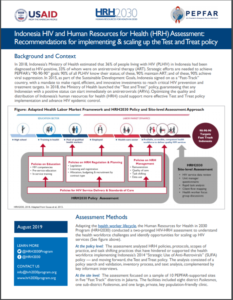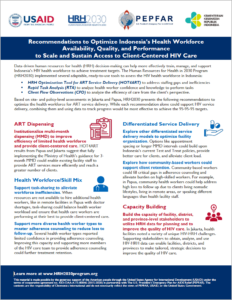15 May Brief Series: Optimizing HIV workforce availability, quality, and performance in Indonesia
Bahan pengumpulan data tersedia dalam Bahasa Indonesia
Data-driven human resources for health (HRH) decision-making can help more effectively train, manage, and support Indonesia’s HIV health workforce to achieve targets. HRH2030 has been supporting progress towards Indonesia’s 95-95-95 targets by conducting policy and site-level assessments to identify HRH barriers to HIV service delivery; building the capacity of stakeholders to use HIV-HRH data for decision-making; supporting stakeholders to be able to replicate and act upon HIV-HRH assessment results; and analyzing results to identify common themes and make recommendations to achieve national targets.
This work involved two phases:
 Phase 1 in 2018 included a policy-level assessment of policies, protocols, scopes of practice, and task sharing practices that have hindered or supported the health workforce implementing Indonesia’s 2014 “Strategic Use of Anti-Retrovirals” and Test and Treat policies, as well as a site-level assessment of 10 PEPFAR-supported sites in “Fast Track” districts in Jakarta. The report makes policy and site-level recommendations for implementing and scaling up these policies.
Phase 1 in 2018 included a policy-level assessment of policies, protocols, scopes of practice, and task sharing practices that have hindered or supported the health workforce implementing Indonesia’s 2014 “Strategic Use of Anti-Retrovirals” and Test and Treat policies, as well as a site-level assessment of 10 PEPFAR-supported sites in “Fast Track” districts in Jakarta. The report makes policy and site-level recommendations for implementing and scaling up these policies.
Access the full 2018 report and materials here.
 Phase 2 in 2019 built upon the recommendations of Phase 1. HRH2030 collaborated with several facilities to implement the HIV-HRH assessment tools, including the HRH Optimization Tool for ART Service Delivery (HOT4ART) to address staffing gaps and inefficiencies, Rapid Task Analysis (RTA) to analyze health worker confidence and knowledge to perform tasks, and Client Flow Observations (CFO), to analyze the efficiency of care from the client’s perspective. The report makes recommendations to further optimize the health workforce for ART service delivery and includes a package of ready-to use data collection tools.
Phase 2 in 2019 built upon the recommendations of Phase 1. HRH2030 collaborated with several facilities to implement the HIV-HRH assessment tools, including the HRH Optimization Tool for ART Service Delivery (HOT4ART) to address staffing gaps and inefficiencies, Rapid Task Analysis (RTA) to analyze health worker confidence and knowledge to perform tasks, and Client Flow Observations (CFO), to analyze the efficiency of care from the client’s perspective. The report makes recommendations to further optimize the health workforce for ART service delivery and includes a package of ready-to use data collection tools.
Access the full 2019 report and data collection resources here.
Country: Indonesia
Resource Type: Report
Topic: Performance and productivity, Skill mix and competency, Strengthening HRH in Indonesia





